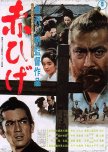
This review may contain spoilers
If you want to help yourself, help others first
Red Beard was the last film Kurosawa Akira and Mifune Toshiro made together. If it had to be the last one, it was a gentle and glorious way to end their partnership. This film seemed uncharacteristically hopeful and optimistic for a Kurosawa film. I found it to be heartwarming and heartrending.Dr. Noboru Yasumoto takes what he thinks is a tour of a backwater clinic run by a dictatorial doctor named Red Beard. In a cruel surprise he finds out that he has been assigned there by the magistrate and has no choice but to stay. A graduate of the Dutch school in Nagasaki, this smelly place filled with poor people is not worthy of his skills. He’s in the game to serve a Shogun, make money and live the easy life. In a quietly dramatic scene, he meets Red Beard aka Dr. Niide. It turns out Red Beard’s rules are for the benefit of the patients and staff in order to keep the clinic clean. He serves people who cannot pay in the afternoon and takes a personal interest in his patients. He believes the body and mind must be healed in order for a person to be cured.
Yasumoto arrogantly decides he will treat the homicidal patient locked up on the property nicknamed The Mantis. In a spectacularly filmed five-minute scene with no edits Yasumoto and The Mantis have a dangerous encounter that ends up altering his view of Red Beard. The older doctor doesn’t lecture, he begins to train the brash young doctor with experiences. He asks him to stay with an older man who is dying. Sitting with the man who is gasping for air, the young doctor can barely stay in the room as death becomes too real. When he’s relieved by one of the women he practically runs out only to be called to help Red Beard in a primitive surgery. A woman with a gash on her side and intestines hanging out is thrashing on the table. Yasumoto finds out he’s not as accomplished as he thinks he is and maybe Red Bed is more accomplished than he thought he was.
Through a series of vignettes focusing on various patients, Yasumoto begins to lose his arrogance. Instead of faceless, nameless people unworthy of his attention, they begin to have names and importance. The gruff Red Beard reveals himself to be flawed but also an exceptional man who cares for people. When the local government cuts the clinic’s funding, Red Beard increases the charges for the wealthy. When a young woman married to an abusive husband needs help, he has no problem blackmailing the local magistrate to help her though he does criticize himself for the unseemly action. And in a scene viewers were surely hoping for, he takes down a group of ruffians creating new patients while rescuing a child from a brothel. Red Beard is a genuinely good man yet like most Kurosawa heroes he’s also a rebel, lying outside the norm.
The last half of the film sees the complete transformation of Yasumoto when Red Beard puts him in charge of Otoyo, the young girl rescued from the brothel. In the process of healing her, he becomes sick and she takes over as his caregiver. And in the spirit of the film as she begins to receive kindness and trust, she passes that on to a small thief in need of it himself. The women who worked there went from distrusting Otoyo to protecting her and thrashing the Madame with daikons when the woman came to take Otoyo away. In one of the most moving scenes I’ve seen in any movie, as a boy is dying the women and Otoyo go to a well to call his spirit back by shouting his name into the well. It was haunting listening them to wail in hopes of saving the child and creatively shot by Kurosawa.
Though the movie is called Red Beard the story is about Yasumoto’s journey from self-centered, over-confident doctor to a humbled physician who sees the whole person regardless of their income. Otoyo became the heart of the film as she went from a tiny world where she couldn’t trust anyone to a larger complex world with people she could trust. Red Beard grounded the film with his wisdom and gravitas.
Near the end of the film, I was surprised to see Ryu Chishu make an appearance during a wedding scene. There were two domestic scenes in this film, something rare in a Kurosawa film unless he’s turning them on their head. Ryu made 52 films with Ozu, a director known for his domestic films. It was an odd, but satisfying cross-over.
As he usually did, Kurosawa made his hero suffer and face trials as he finds the courage to help others. In this film that meant small acts of kindness that blossomed into more, slowly changing the lives of others. Instead of trying to transform the political system, it was more about changing the people around them, healing them mind and body. Though the world outside was cruel and filled with suffering the clinic was an oasis of charity and good will. Yasumoto had Red Beard to be his master and show him the way. Yasumoto returned the favor by helping others.
The music was beautiful, heavily influenced by Brahms and Hadyn. Natural sounds and bells were often interspersed with the moving score. Kurosawa also used long wordless scenes layered in deep meaning. The actors expertly played their parts. Mifune portrayed the wise older doctor with a gentle flair. I did, however, enjoy him going into action mode, doctor style, even briefly. Kayama Yuzo took Yasumoto from an unlikeable petulant jerk to a compassionate and more open-minded adult. Niki Terumi as Otoyo showed a traumatized young girl and then one learning confidence in herself and others convincingly. Kurosawa also had some great shots, one I have to mention is when a female character walks out of a cloud of dust after an earthquake, devastation all around and in the distance a line of people scurrying away. Magnificent.
The only detractions for me were in the first half of the film, there were four perfidious women who caused some of the characters man pain. I’m often not a fan of Kurosawa’s view and portrayal of women. He did redeem himself some with Otoyo’s story and the women who worked at the clinic who often formed a sort of Greek chorus or cheerleading squad for the other characters.
Overall, this was an enjoyable film. Despite the cruelty humans caused one another, the people in the clinic reached out to heal. I laughed, I cried, I got angry, this movie took me on a three-hour ride that was over too quickly. This film was Kurosawa’s final hero film and Red Beard and Yasumoto were deserving heroes with which to end that era. Red Beard’s advice to help others in order to help yourself is still a worthwhile sentiment.
11/15/22
Was this review helpful to you?
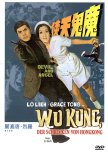
This review may contain spoilers
This devil in blue jeans knows how to kick!
Devil and Angel is a classic kung fu revenge movie. The action runs almost non-stop even when the logic runs out.Lo Lieh joins a heist gang to gain enough money to marry his sweetheart. Instead of instant wealth, he’s set-up and lands in jail. Upon exiting jail, he rejoins his girl and plots his revenge against the men who hung him out to dry.
That’s it and probably more plot than a lot of kung fu films. Lo Lieh carries this film with his charisma and athleticism. I was happy to see him in the, if not good guy role, a not completely bad guy role. He also directed and co-wrote the script. If he were still alive, I would like to ask him about that WTF ending.
Many of the standard kung fu guys populated the screen. It was fun to see Tien Feng, Wu Ma, and Fong Yau in street clothes instead of wigs and historical wear. The fights were solid and entertaining, choreographed by Lau Kar Wing and Chan Chuen. Before Capt. America exited as the only man standing from an elevator full of baddies, Lo Lieh did it in 1973.
For a low budget kung fu flick, it was put together fairly well. There was plenty of generic ‘70s music, lots of bow chicka wow wow guitar action, even a rock ‘n roll band at one point. Lo Lieh made good use of the city for stalking and fights with old school overlays. That doesn’t mean there weren’t plenty of cringey campy scenes, including a slow car chase through a parking garage and the hills outside the city. But with this type of film they are to be expected.
Given the constraints, not a bad first directorial effort for Lo Lieh although I did ding his score for that ridiculous ending. As always, I grade these old, niche movies on a curve. This type of movie is only for hardcore fans of the genre.
11/12/22
Was this review helpful to you?
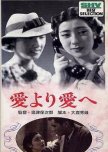
This review may contain spoilers
So Goes My Love is a short, sweet, predictable love story, but that doesn't mean it was bad. Just short, sweet, and predictable. Shigeo and Miyako have fallen in love and moved in together, against his father's wishes. Being the first born son and heir and stubbornly choosing his own mate has gotten him disowned by his traditional father. Shigeo doesn't care, he's willing to rough it as he works on his novel while Miyako works as a hostess at a nice café. It doesn't take long for him to realize that writing is hard and living takes money. He berates himself for being a loser and Miyako for loving such a loser.
Shigeo's sister, Toshiko, comes along to break up the monotony by giving them a surprise visit as she wonders at the lower classes. Miyako treats her with respect and kindness, despite the sudden visit as she is readying for work. Toshiko takes one look around and realizes this woman is no gold-digger but someone who would be a good wife for her churlish brother.
Shigeo visits his uncle to try and find work, but his meddlesome uncle creates more problems for him. One by one the family members are won over by Miyako's kindness and sincerity, but will it be enough to break through the patriarch's stone heart?
Many of the problems in this story were created by the collision of traditional and modern values as well as generational conflicts. There was also the issue of the prideful male egos at play. As the heir, Shigeo had bucked tradition and chosen his own mate, something his father seemingly could not accept.
As with many films from this era there was a mix of traditional and Western dress and furniture. Toshiko took the couple out to a German movie which Shigeo walked out of. It made me wonder if the director’s personal beliefs bled through about this turbulent political time.
Most of the acting was natural and believable. Takasugi Sanae gave a gentle performance as the kind and hard-working Miyako. Takamine Mieko as the vivacious sister provided just the right spark as the bridge between the couple and Shigeo’s family and a cheerleader for the lovers.
The only drawbacks for me were the cold father and son, with few words of encouragement for anyone. I wondered what Miyako saw in Shigeo. We come into the story with his male pride damaged by not having the skills to write and unable to find a job while Miyako goes off every night to work. Despite their differences the couple deeply loved each other.
Even with Shigeo’s occasional rude behavior, typical of so many cold male leads, I enjoyed this short, simple romance. It didn’t explore any new territory and didn’t delve deeply into societal or relationship woes, it was just a straightforward story of a boy and a girl who have to decide if the struggle and their love are worth the pain.
11/12/22
Was this review helpful to you?

This review may contain spoilers
Poisonous or poisoned?
This is the tale of a "poisonous" woman, you know, the kind that is independent, morally gray, and does what needs to be done to support her husband. The kind of woman who can upend society and must be dealt with before she brings a country to its knees. Oden was just such a woman. This story was very loosely based on the last woman to be beheaded in Japan. Directly after her execution they did a primitive autopsy, paying close attention to her female parts in order discern what caused her to be a deviant woman.In this film, Oden had an ex-husband who was a degenerate gambler, an alcoholic and a womanizer. He took care of their daughter and I use that term loosely. She also had a current husband with TB who depended on her completely and yet constantly berated her for finding ways to bring home money. After a botched shoplifting job of a diamond she ended up with a Yakuza lover and a police officer lover. Of all of them, it was the officer whom she fell in love with and the one she was willing to walk away from in order to keep him from ruin.
The Yakuza forced her to bring him women for his sex slave operation. Constantly bounced between the demands and desires of the men in her life, including their violence, it was no wonder Oden wandered down a dark path. When at last she found the courage to make a break with all of them and to take her daughter away to start a new life, tragedy struck.
By the end of the movie all the main players converged in Yokohama. A police officer showed up looking for her, not the violent boss in control of her, but this dangerous woman. The young officer who had fallen in love with her had completely lost his way and his job, poisoned by her love. The sweet young girl he was supposed to marry became ensnared in the destructive drama as well. By this time Oden was ready for revenge against the men who had helped guide her to this sorry state. In a fiery, bloody climax, normalcy once again wrestled control of the situation. Oden had fought to survive in the only ways she could find available to her, was utterly failed by every man in her life, and yet she was considered the destructive poisonous force.
Wakasugi Katsuko made for a beautiful conflicted criminal. She was able to play the soft woman who wanted to help the people in her life and the heartless woman who could lead women like herself into the lair of a sadistic crime boss.
Even though Oden did some reprehensible things, her charm and allure made her a fascinating character. I suspect I saw the character through more sympathetic eyes than the director did. Instead of being a poisonous danger to society, I saw a poisonous society that had let her and her daughter down. Had her first husband cared for her and his child instead of drinking and gambling away their money she might never have turned to crime to support herself and others around her. In the case of A Wicked Woman, I found Oden to be the one poisoned, never finding the antidote or someone to save her.
11/11/22
Was this review helpful to you?
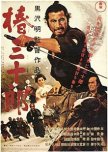
This review may contain spoilers
Aren't you tired of being stupid yet?
Director Kurosawa and Mifune Toshiro brought back the iconic samurai character, Sanjuro, for this sequel to Yojimbo. Once again turning the genre on its ear, Kurosawa questioned the violence and death of the samurai code and the genre and asked his characters to distinguish between reality and appearances, duty and wisdom.Nine young samurai are in a quandary after the Chamberlain has rejected their report on corruption, thinking he must be the problem. The Chamberlain had warned them that appearances can be deceiving. People are not what they seem. And with that we are giving the central theme to this film. And Mifune's introduction as he walks into the temple room stretching from an undetected nap in the back. Scruffy, scratching, with a beard and unshaved head, the young stoic samurai were not impressed with the man in front of them. But this Sanjuro, more controlled in demeanor and wiser than in Yojimbo immediately sizes up the problem. The Chamberlain is unattractive, and the Superintendent looks the part, thus causing people to distrust the one and trust the other simply by appearances. He immediately grasps that the young samurai are about to be attacked and saves them.
This casual ronin has grown since his last adventure. Where he conned the locals for money in Yojimbo, here he takes only what he needs. The 9 act as one and think as one, trailing after Sanjuro like a centipede. Again and again, he has to calm their foolish headstrong ways, questioning their rules and conformity which is leading them into a dangerous pit. This Sanjuro is a mentor and altruistic, constantly putting himself in danger to keep the young ones out of it.
Whereas Yojimbo was a dirty, dilapidated town, this film is all clean with neat lines. The characters are rigid and vertical, while Sanjuro is loose and often found reclining. Not that Mifune forgot how to swagger, he still had that virile swagger set to music on several occasions. In most of the shots with The 9 he is set apart somehow, a loner who likes to be alone and doesn't play by the samurai rules.
When they rescue the Chamberlain's wife we hear the second theme of this film. The wife tells Sanjuro, "You are like a sword without a sheath. You cut well, but the best sword is kept in its sheath." While this film does have several fights and deaths, the message that violence is not always the answer comes through loud and clear. The wife's mercy for a guard they capture became one of my favorite comic parts of the film. Stashed in a closet he would come out and give words of wisdom as he discovered the Superintendent was the corrupt person and not the Chamberlain. The captured guard was a good man, saved from death and wrong living by not being cut down for honor's sake.
This was a gently comic film as Sanjuro worked to keep the young samurai alive and rescue their leader. Just as he did in Yojimbo, Nakadai Tatsuya played Mifune's nemesis. Nakadai's Muroto, like Sanjuro, was a warrior from the old school. The two recognized the tiger in each other, both unsheathed swords.
So great was the message of sheathing swords that the main climax came with cut camellias instead of pools of blood. Only at the end when the inevitable duel between Sanjuro and Muroto could no longer be avoided, did the blood fall. Kurosawa gave us 35 seconds of silence as the two samurai sized each other up. His use of silence in film is one of the things I enjoy. It builds tension and slows the action so that we have time to process what is about to happen.
My love for Kurosawa's shots is great. His frame-within-a-frame shots were stunning in this film. A night scene in gauzy smoky light wafting about Mifune and Nakadai was striking. His use of wide-angle shots, boom shots, low shots all brought this story to life in the most vivid way.
Mifune had this scratching, confident, at times vulgar, character down. With his cat-like speed he perfectly played the samurai who hated to draw his sword, but when called upon was proficient. Going against the grain, no longer a ronin because he couldn't find a master, now one by choice as he wandered alone. A rugged individual, he could not be an obedient servant confined to the rules of bushido. Though only a year had passed in the real world, Mifune's Sanjuro had matured immeasurably in film time.
There were some repetitive moments and places where the plot and action slowed uncomfortably for me, but overall, I found this film entertaining. Mifune's Sanjuro was fun to catch up with again, a samurai like no other, one that broke the mold. It was with sadness that I watched that scruffy, wiser, warrior walk off into the sunset.
10/17/22
Was this review helpful to you?

This review may contain spoilers
Gamera’s greatest hits from the 60’s &70’s!
A last ditch cheap effort to keep a studio afloat resulted in Gamera: Super Monster. Spoiler alert! All of Gamera’s finale fights from the previous movies are spliced together in what amounts to a clip show.Zanon’s pirate ship is orbiting Earth, a ship that looks suspiciously like a Star Wars Imperial Star Destroyer. The Big Bad who is never seen sends his female minion to Earth and subsequent monsters to try and conquer the Earthlings. Earth has three space women to help out even though they have no weapons and spend most of their time doing a little dance to change from space women clothes to Earthling clothes. It can’t be a Gamera movie without a little boy who can communicate with him and this one was the least annoying of the Gamera movies I’ve seen.
There’s not a lot going on with the humans and space women except running back and forth between their magic van and their cover jobs including a pet shop. They also watch Gamera fight on what amounts to a big screen tv, even the clip from him fighting on a different planet.
The clips don’t always match up with daytime and nighttime from scene to scene. If you like the Gamera March song in the opening credits you are in for a real treat because the little boys sings it several times during the movie.
It’s a glorified clip show but one with a good heart and likable cast. There’s no doubt this Gamera movie was aimed at children and with that sentiment and it’s age I gently scored it. Only for people who don’t want to sit through the previous 7 movies (and maybe a cartoon as well?) but want to see the final monster fights or you like seeing 3 women dance to change clothes.
10/14/22
Was this review helpful to you?
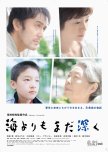
This review may contain spoilers
What kind of future was I dreaming of?
Director Koreeda Hirokazu challenges three generations of the same family to live in the moment regardless of where they thought they would be or where they want to be in life in After the Storm. A typhoon draws the family members together and forces them to face the illusions they've created and the things they've given up.Shinoda Ryota (Abe Hiroshi) is the divorced son spiraling down the drain. Only valuing his family after losing them, he works at a detective agency to spy on them. Early success as a writer has now crippled his creative desire and confidence leading him to spend too much time at the racetrack which leads him to sponging off of others.
Shinoda Yoshiko (Kiki Kirin) is the recently widowed mother who instead of mourning is feeling freed from her former convention, even taking a classical music class. This gentle matriarch is the touchstone for truth who connects the characters.
During Typhoon 24, Ryota, his mother, his son, and his ex-wife Kyoko are stuck in Yoshiko's small apartment. During this time excuses and damaging filters are slowly washed away. Yoshiko pointedly talks with her son, "I wonder why it is men can't love the present. Either they keep chasing whatever it is they lost. Or they keep dreaming beyond their reach." Ryota has been hanging on to his ex-wife and the family life he thought he had but never lived, his father's legacy of disappointment, and his writing. He's always looking for the next big deal whether through gambling or some other illicit way instead of working consistently and facing his fears. For his mother life is simple, it is to be lived and enjoyed wherever you are. Ryota begins to shake off the past and realize a relationship with his son is worth fighting for in the present.
Abe Hiroshi had the difficult job of making Ryota at least somewhat sympathetic, not an easy thing to do for a character who is always looking to others for money. Kiki Kirin was the revelation in this film as she gave a splendid performance as the mother who loves her imperfect children, always hoped to be out of the apartment complex she's lived in for 40 years and tries to help her family find their place in the world with the time she has left. Of all the performances, hers is the one I'll remember and the one which touched my heart.
After the Storm is a slow-paced look at characters, especially Ryota as he glacially evolves from the wretched self-centered man who only wants what he can't have to someone who catches a glimmer of what can be. He could be frustrating to watch as he chose the easy way out at a cost to others. Yoshiko's compassion and honesty helped to balance out the emotional weights of the film.
For all of the adults, life hasn't turned out the way they planned. Life rarely does. But wherever we are that is where life is and we are called to live it in the present moment. Ryota finally states, "I haven't become what I want to be---yet." While there is time there is opportunity to become who and what we yearn to be. "So long to myself from yesterday."
10/12/22
Was this review helpful to you?

This review may contain spoilers
Two out of three ain't bad
Gamera 2 was my least favorite of this particular Gamera trilogy. With a larger budget than Gamera 1, the special effects were bigger and louder, but its heart wasn't.In a world with Kaiju, a meteor headed toward the Earth is never just a meteor and this one was no exception. Before you knew it, Japan had a silicone-based infestation on its hands.
I didn't find Destoroyah, I mean Legion, particularly terrifying even with the blood spurting and city annihilations. Neither Legion's costume nor Gamera's were particularly inspired. I love guys in rubber suit Kaiju costume movies so that wasn't a problem for me. Most of the fight scenes were done in the blurry dark which obscured the suits even more. The immediacy and scale of these creatures compared to the populace and buildings was lacking. There weren't any real money shots of Gamera up close either. And I wasn't a fan of his new flying capability, I liked the retro spinning saucer style.
Gamera is a Kaiju if not for the people, at least for the Earth, and he's always on hand to dispense with whatever malevolent force comes along (look out humans, you may be on his list!). He usually has someone who has a personal connection with him and that was missing from this movie. While there was a group of children keeping watch over a possibly dead Gamera, that personal connection felt disconnected. None of the main characters ever felt like they were in imminent danger either further distancing them from the action.
The human cast was all fairly likeable and easy on the eyes, even if too much of the movie centered on them. At least they were able to take care of one problem with the Legion near the end of the movie instead of being completely reliant on Gamera.
For low budget 1996 special effects, Gamera 2 did an adequate job. The miniatures were excellent and were believably blown up and torn down. How they ever find someone to do tank duty when a Kaiju comes to town, I will never know! And in a world with Kaiju, if a giant extraterrestrial that is on a killing spree torches a building and lays a huge pod on it, I would get out of town---fast! See ya! Wouldn't want to be ya! But instead, people are still milling around the streets and have to be told to leave.
For me, this Gamera felt impersonal, and I never connected to the monster risking his own life and shell to protect Japan. There were still some entertaining scenes and the humans weren't annoying, a huge plus in this genre. If you are a fan of Gamera it is definitely one to try. It can stand on its own, but best to watch this trilogy in order to better experience it.
10/04/22
Was this review helpful to you?
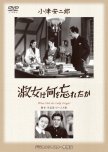
This review may contain spoilers
"I drink upon occasion, sometimes upon no occasion." Don Quixote
Ozu is one of my favorite Japanese directors/writers, but he missed the mark with What Did the Lady Forget for me. Not dramatic enough to be a drama and not funny enough to be a comedy, it languished in a dull middle ground somewhere lost in a mathematic word problem.I knew I was in trouble when for the first 20 minutes of a 70-minute film we were treated to a university lecture on Salmonella and junior high school boys dealing with mathematic word problems. I found myself wondering where Ozu had found the props and how hard the staff worked at polishing the sets to a shine as he required.
The premise of the story was a domineering housewife and a docile professor husband-a classic Ozu gender role reversal. Tokiko, the wife, insisted that her husband play golf each weekend which involved an overnight stay outside of town. The problem being, he didn't like to play golf, so he was always figuring out ways to make it look like he'd golfed but hadn't. Most women balk at a husband taking an overnight trip every weekend instead of encouraging it making this a very foreign concept. Maybe she wanted some peace around the house, but she wasn't doing anything interesting while he was away except gossiping with her friends.
In walked another of Ozu's standard story upheavals-a modern niece, Setsuko, who wore western clothes, smoked, drove, and drank. She and Komiya, the husband, became co-conspirators when he was staying with a male student during his aborted golf trip and they both showed up at the same bar. They had to hide where they had both been to Tokiko who was furious when Setsuko came home drunk after midnight and was brought home by Komiya's student. It actually sounds more interesting than it was, even a night out at a geisha house became a drag.
Setsuko began to berate Komiya for not being masculine enough and not wearing the pants in the family which after a fight between the three ended up with Komiya slapping Tokiko. Instead of throwing fuel on the fire, Tokiko was thrilled and felt like it showed her that Komiya loved her. She bragged about it to her friends and the role reversals were reversed and everything was put back into its proper patriarchal relationship. The cutest scene was at the end when Tokiko made a sweet move on Komiya which led to a night of bliss. It would have meant more to me if he hadn't slapped her to get it. That Setsuko was just as domineering as Tokiko and ordering Komiya about never seemed to occur to her or him. I'm guessing the title refers to Tokiko and how she had forgotten that Komiya was the head of the household and that is what would lead to harmony in their home.
This was supposed to be a comedy, but I didn't get it, if it was funny, it was far too subtle for me. I get that it was a classical farce set up, the situations just didn't come across as very humorous. Slapping Tokiko to put her back in her place ruined this film for me and for the most part I found it lacking in any emotional depth to begin with. The sets, costumes, and frames were attended to with the greatest care as is to be expected with Ozu, it just didn't feel like he developed the story with the same care.
10/3/22
Was this review helpful to you?
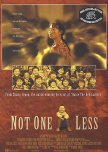
This review may contain spoilers
Director Zhang Yi Mou left Gong Li and Zhang Zi Yi behind along with his penchant for saturated colors and rousing scores. He settled into the dust of a poverty stricken rural community far removed from the upwardly mobile citizens of the nearest city. The focus of the film was a crumbling schoolhouse and a 13-year-old substitute teacher tasked more with keeping the kids in school than teaching them.The majority of the characters were played by local people using their real names. When the film's older teacher has to leave to care for his dying mother, the mayor of the village hires the only person he could find, Wei Min Zhi, a teenager from another village who is barely older and more educated than the children she will be instructing. The school has been hemorrhaging children due to their parent's poverty and she is offered a bonus of 10 yuan (aprox $1.50 USD) if she still has the same number of kids when the teacher returns. In the dilapidated schoolhouse, chalk is like gold and the teacher parses out exactly how much she will need over 26 days.
At first the kids are running the show with Zhang Hui Ke, an energetic 11-year-old leading the insurrections. Wei is in over her head and somedays closes the door to keep the kids in while she sits on the outdoor step. One day Hui Ke doesn't report for class and Wei finds out that he has gone to the city to earn money for his debt ridden family. Refusing to accept his loss she seeks help so that she can travel by bus to the city to return him but is turned down. The kids come up with the idea to move bricks at the local brick factory to earn money for her bus ticket learning math along the way. Even with their work they can't come up with enough cash. Eventually, Wei does make it to the city where the little boy is lost as it turns out. She relentlessly searches for him and runs into more bricks in the form of bureaucratic brick walls, unable to get anyone to help her. This little pink cheeked substitute is not so easily deterred though and begins to wear people down. That she is near penniless and forced to scavenge food and sleep in the streets much like Hui Ke never seems to occur to her.
Zhang Yi Mou's look at the class differences and the detriments of growing up in poverty was interesting. Wei has no identification, no cell phone, no pager, a complete alien in the city. Unlike the village where everyone knows everyone else, the city is filled with mostly hostile strangers, even those with cell phones who sleep in the bus station. At the end of the movie it mentions 1 million children drop out of school due to poverty even as China moves financially forward and this film highlights how 3 yuan (42cents USD) for a Coke is completely out of reach for the children, most who have never tasted it even though it's sold in the local store. And the 20 yuan (less than $3) needed for bus fare might as well be a million.
Most of the children gave bright, emotional performances, especially Wei Min Zhi and Zhang Hui Ke. While I enjoyed the film and Wei's persistence, some scenes ran a little too realistically close to time. The city scenes went on too long for me. Yi Mou might have been trying to show Wei's dogged patience, but it also tried mine until the skies finally opened up for her. Fortunately, Yi Mou glossed over the danger penniless young people can face in the city.
Not One Less made me think of a shepherd searching for a lost sheep in a flock of indifferent sheep. The natural performances and stripped down story came across as authentic and heartwarming even when veering into the realm of a fairytale. The children may have lingered too long in the city but the gratifying culmination of the story was worth the wait and the trip.
9/22/22
Was this review helpful to you?

This review may contain spoilers
"You weren't given a hand grenade for nothing!"
In the waning days of WWII on a small jungle island in the Philippines, the Japanese soldiers found themselves outmanned, outgunned and perilously short on supplies. Fires on the Plain showed the ravages of hunger and despair not only on the human body but on the mind as well.This film was a fascinating look at war through the eyes of PFC Tamura. He found himself in a foreign land with no place to go. He had been to the army hospital to be treated for TB but returned to his company only to be rejected by his squad leader. The company had been decimated by enemy fire, lack of artillery and ammo, but more than anything starvation. The men took turns foraging for yams and bananas to feed themselves and Tamura was too weak to be anything but a drain on already strained resources. He was told if the hospital refused him again to stay there and when the time came to use his grenade on himself. Upon returning to the hospital Tamura found himself with a group of "squatters" kept outside the makeshift hospital presumably left to die. He made quick friendships with two of the squatters. Peace did not last long as the hospital was shelled and those who survived scattered.
As the days dragged on, Tamura found himself wandering alone, knowing he would die. Yet he still filled his canteen, still put one foot in front of the other and continued walking though he had no destination except survival. Along the way he met others and found that everyone was going toward one town with the hope of being evacuated. Poignant scenes of bodies left to lie in the muddy tracks of the road with Tamura refusing to look as he continued on were searingly painful. Even during these dark moments, lighter ones were interspersed as a boot exchange took place one after the other. Before the bedraggled and exhausted men lay a muddy marsh beneath a road on a hill, and a cleared field to cross, dangerous obstacles where the enemy could take advantage. After a disastrous attempt, Tamura found himself alone again wandering up a rocky hill with bodies strewn about like dead ants. Still resigned to dying, he trudged ever onward.
Eventually, he was reunited with two of the squatters and introduced to "monkey meat" and the madness hunger and despair can bring.
Tamura was an affable character rejected for being too weak, yet he never accepted much from anyone and shared with others. He survived when much of his company died and never gave up his humanity as he witnessed humanity in all its varied shades of black and gray around him.
Filmed only 14 years after the end of WWII Fires on the Plain was a critical look at war. These were not glorious, patriotic, die before capture soldiers. The men were starving, defeated and only wanted to go home. The enemy was not only the Americans and Filipino guerillas, but also hunger, desperation and even each other. Many struggled with the will to live and the will to not die. Some wanted to be captured so that they could eat corned beef and others were afraid the Americans or Filipinos would kill them. With American fears of booby-trapped bodies it was a real concern, yet they also showed American medics picking up the wounded after a skirmish. It was also a harsh admittance of stories of cannibalism of both Japanese soldiers and captured foreign soldiers. There was nothing easy about this film.
Funakoshi Eiji gave an understated performance as Tamura as he navigated the roads of death, clinging to his humanity, not even sure where his will to live came from. The skills of the supporting actors varied but most carried off the madness, stoicism, and fear so many of the characters endured. Filmed in black and white the movie had beautiful cinematography. You could feel the claustrophobia of the jungle not knowing where the danger could come from, the muddy paths and rocky ground under bare or near bare feet. The music perfectly reflected the feelings of the characters and the situations they found themselves in. I'm not a film student but I can say this was well made and edited in the eyes of an amateur.
Fires on the Plain showed desperate men and what they would do and would not do to survive when left abandoned without hope or rescue. Though it could be starkly pessimistic in its view of war, tiny rays of hope pierced the gloom on occasion keeping it from being overtly oppressive. Fires on the Plain might not be for everyone but it is a movie I will not soon forget.
8/30/22
Was this review helpful to you?
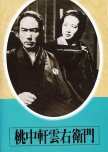
This review may contain spoilers
If he will cheat with you, he will cheat on you!
Man of the House is a biopic based on Tochuken Kumoemon a rokyoku performer who died 20 years before this film was made. The protagonist was thoroughly unlikeable making this a difficult film to watch. Tochuken developed his performances by experiencing other people suffer, usually the women in his life. He was an insufferable "artist" who had no grasp of what real emotions were or the courage to actually feel them.The film begins with Tochuken and his second wife Otsuma along with his troupe, traveling by train to Tokyo for his biggest performance ever. Those around him were concerned because eight years ago he'd created a scandal by having an affair with his shamisen player and divorced his wife. Now he's married to Otsuma, who is dying of tuberculosis. He has the troupe disembark in a town before arriving in Tokyo where he disappears, drinking and hanging out with geishas. His manager warns him against a relationship with the geisha Chidori for fear it will harm his wife's health. Tochuken brushes him off saying that Otsuma is a performer and knows it will help his performance. Once again, he is surrounded by scandal and in the newspapers for the wrong reasons.
His son from his first wife travels to see him but Tochuken has little time for him. He stresses that the worst thing a man can be is weak. Yet when his son stands up for his stepmother begging his father to dismiss Chidori, his father runs him off. Otsuma tells the son that they have to accept Tochuken's behavior if it helps him to perform. When Otsuma finally confonts Tochuken, he tells her that even if his performances are not as good, people love him more.
Tochuken loves to brag about his toughness. When out hunting he approaches a bird too closely and blows it to bits, much like the women in his life. As Otsuma's condition deteriorates he refuses to visit her in the hospital. He wants to remember her as a performer and not as a mere woman. Ultimately, Otsuma gives him one last performance.
I'd like to think Director Naruse was casting a critical lens on the self-absorbent, cruel behavior of a performer who excuses his actions saying it's all in the name of art. Even now, nearly 100 years later, gifted men are afforded great latitude in the name of allowing them to develop their craft whether it's acting or mathematics or politics.
Tochuken said the worst trait a man could have is weakness. As someone who could not face reality and true suffering with a posse of enablers around him to insulate him, he more than any other showed himself to be weak and pathetic. Man of the House was well made, though somewhat faded, the care of the shots shown through. Tsukigata Ryunosuke was handsome as the devilishly charismatic actor. And Naruse carefully spotlighted Tochuken's almost gleeful destructive behavior toward those closest to him which again, I'm going to take as a criticism of the egocentric behavior. Not an easy watch by any means but worth trying if you are a fan of Naruse's films or biopics, even one with a troubling subject.
8/15/22
Was this review helpful to you?

This review may contain spoilers
I will give up kindness in order to fight for justice
White Vengeance gives an epic look to the story of Liu Bang and Xiang Yu as they struggle to see who will ultimately wear the crown after rebelling against the Qin Dynasty.Despite the gorgeous, colorful costumes, grand battle scenes, excellent cinematography and strong cast, White Vengeance could never figure out what the focus of the movie was. Was it the bromance gone wrong between the two men determined to become the next emperor? Was it a love story? Or a love triangle? Was it a bromance between the the two advisors to the opposing sides? The beginning of the film was particularly vexing as the focus jumped back and forth between characters and also time jumping leaving the viewer with no clear ground to stand on and making it hard to find their bearing in the story. If you are completely unfamiliar with this this historical event, it may be even more confusing. If you are familiar with the history, you may be upset with the obvious artistic liberties taken.
The famous banquet contained few of the historic events. If the beginning of the movie was confusing and moved too rapidly, the ending dragged and was quite anticlimactic. The changes to Xiang's and Yu Ji's story didn't move me, in fact, the changes caused me to roll my eyes. Director Lee couldn't seem to decide if Xiang Yu was an evil emperor wanna be or a tragic romantic hero. Liu Bang came across as having almost no agency of his own and being completely dependent on others until he made the quick jump to pathologically paranoid.
Feng Shao Feng played Xiang Yu and did a fine job, but lacked the fiery presence for a renowned warrior. Leon Lai's subdued performance lacked the cunning edge of the future emperor. Zhang Hanyu as Zhang Liang and Anthony Wong as Fan Zeng, the two strategists behind the big men gave the most compelling performances. Their two characters were the most interesting as well. Liu Yi Fei was the woman passed back and forth between the two leaders with little to do.
With the exception of a few wuxia style scenes that did not fit comfortably into a movie based on historical events, the fights and battles scenes were well choreographed. The CGI enhanced armies played well, with only a few glitches.
The look of White Vengeance was exceptional. However, WV's erratic focus and underdeveloped main characters took away from my enjoyment worsened by the creative license taken with the historical events.
8/12/22
Was this review helpful to you?

This review may contain spoilers
All my effort is rewarded with a slap!
Director Ozu tread over common 1930's cinema ground in this film. Once again, a strong woman who sacrifices all for her family and the fear of unemployment loom during a time of economic crisis and cultural upheaval.Woman of Tokyo managed to pack a fair amount of tragedy into its scant 47 minutes length. Chikako worked an office job during the day and told her brother, Ryoichi, she helped with translations for a professor at night. She paid all of the bills and her brother's tuition as well as giving him spending money. Ryoichi's world turned upside down when he found out that his sister was actually working as a prostitute at night leading to tragic consequences. Chikako only desired for her brother to graduate so that he would have a stronger chance of landing a job, something he was unable to appreciate.
My reaction to this film might have been better if so many of these early films didn't focus on women becoming prostitutes to provide for their men, whether husbands, children or brothers and then bearing the brunt of abuse from those men and society. In a world where male unemployment was high and job opportunities were scarce for women, the women still did what was necessary to feed and shelter their families sometimes voluntarily, sometimes not. And in the case of Woman of Tokyo, like many other cinema sisters, put their brothers through school. This film would have fared better with me if Chikako had ever set her brother down and explained the facts of life to him and the reality of their situation. He lived a carefree life going to school, hanging out with his friends and with his girlfriend while his sister worked day and night to provide for him. His pocket money for entertainment came at the sacrifice of her body and shame. The police were also investigating her as a "dangerous person". To bear his reproach and scorn and society's as well seemed absurd. Women's pride always seemed to take a backseat to providing for their fragile men. I know it was a different day and time, different culture and a time of transition but this film hit my feminist's rant button as I watched it.
As always, Ozu put together an aesthetically pleasing film. A teapot as it boiled and steamed and then calmed followed much of the mood of the film. The version I watched had no sound. Tanaka Kinuyo, as the girlfriend who spills the gossip and Egawa Ureo as the thoughtless brother have shown up in other Ozu films and always do a good job even in this film where they are given little time to develop their characters. Okada Yoshiko's performance varied as she played the sweet dutiful sister sending her brother off to school in the morning and warmly welcoming a customer in the evening. I wish Ozu would have let us see into her feelings and motivations more instead of leaving her largely silent and stalwart.
If you are a fan of Ozu's films or silent films, Woman of Tokyo is worth seeing, even if it feels the theme may be redundant to some of his and other directors' works from this time.
8/6/22
Was this review helpful to you?

This review may contain spoilers
Do not excel, do not fail
Samurai Marathon is based loosely on a true story in 1855 around the time the Americans came calling in their "black ships." A local lord decides he needs to toughen up the men in his village who have been accustomed to peace by having any man under 50 compete in a 36 mile grueling marathon. Trouble began when the resident ninja spy mistakenly sent word to the Shogun that the lord was planning rebellion misunderstanding that it was a drill. Oops! The town of Annaka still holds a race in honor of the samurais' run.Samurai Marathon is one of those movies you have to be patient with. It starts off slow, very slow, with a multitude of characters introduced with barely enough time to register faces and motivations, certainly not enough time to care about many of them. Satoh Takeru plays the super secret ninja spy who makes the error and then spends the movie trying to clean up his mistake. Komatsu Nana portrays a princess who just wants to be an artist and has no inclination to marry the man her father is setting her up with. And that guy would be Tsujimura Heikuro, played by Moriyama Mirai, a character that straddles morality. The local lord promises a wish to the first man across the finish line and Heikuro is determined to be that guy by hook or by crook. Other colorful, but not very memorable characters fill out the race roster.
The movie finally gets some traction at the halfway mark when the race has begun and the disparate groups face off against each other. There are several fierce sword battles. Director Bernard Rose, no stranger to horror, included some particularly gruesome decapitations. An assassin with a six-shooter increases the menace. Seriously people, a serpentine exit is the best strategy, don't run away in a straight line!
With a cast this large and unwieldy, the acting was fine. Even with the few weaker performances, the characters scarcely have enough time on screen running for you to notice. The first half of the movie was disjointed and could be confusing racing from character to character. The pacing was uneven at best until it finally hit its stride. I will say that in the opening scene when Danny Huston as Commodore Perry makes an appearance, I thought he would play more into the story. When this actor shows up in a movie you know it's time to hide the jewelry and the women and children, he always plays a baddie. For the most part, short of introducing the handguns, he provided little reason to take up screen time.
Samurai Marathon is not a bad way to spend your time if you can make it through the first hour and still be engaged. By the time the mud covered motley crew of runners dragged into the castle I was rooting for them, well, most of them.
8/5/22
Was this review helpful to you?

 54
54 188
188 11
11






















